外研版(2019)必修第二册Unit 4 Stage and screen Using language 课件(共42张PPT)
文档属性
| 名称 | 外研版(2019)必修第二册Unit 4 Stage and screen Using language 课件(共42张PPT) | 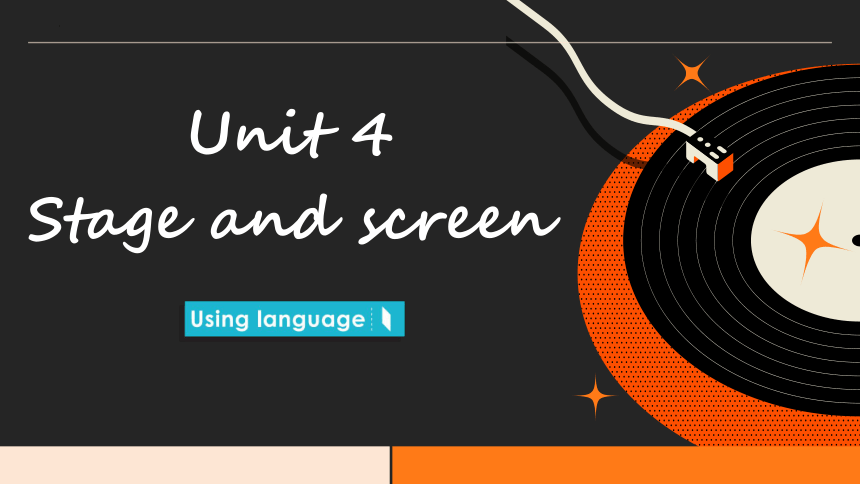 | |
| 格式 | pptx | ||
| 文件大小 | 11.8MB | ||
| 资源类型 | 教案 | ||
| 版本资源 | 外研版(2019) | ||
| 科目 | 英语 | ||
| 更新时间 | 2024-08-23 21:05:02 | ||
图片预览

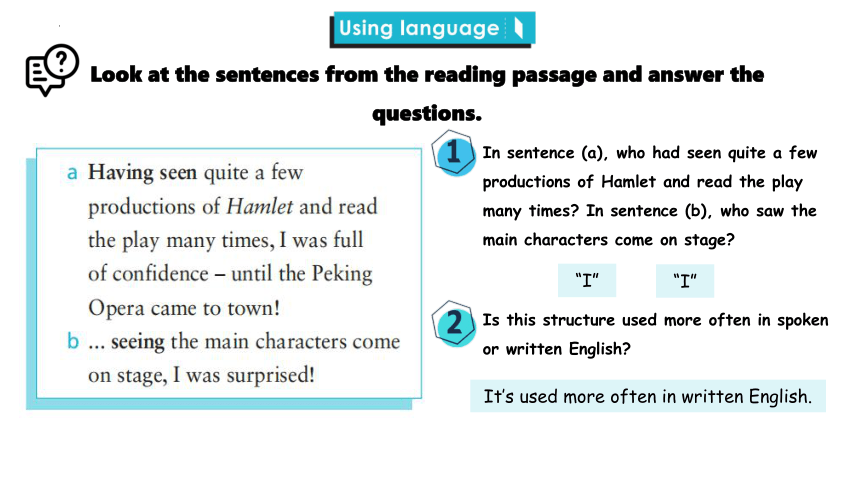
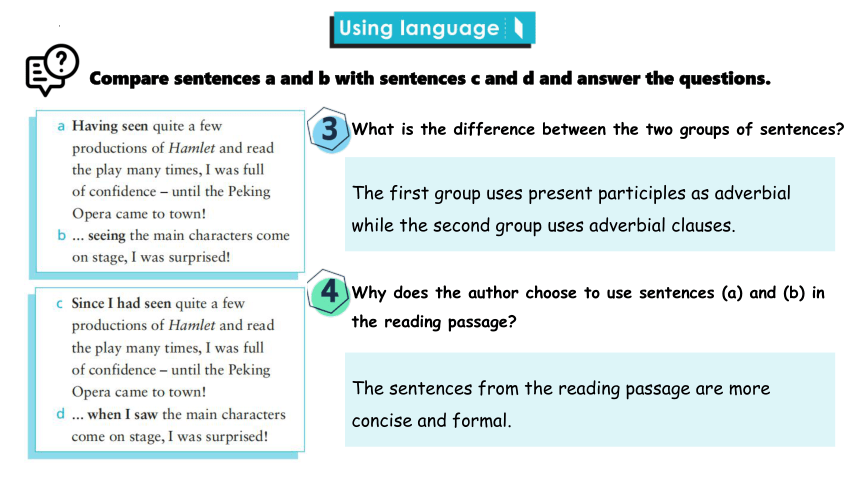


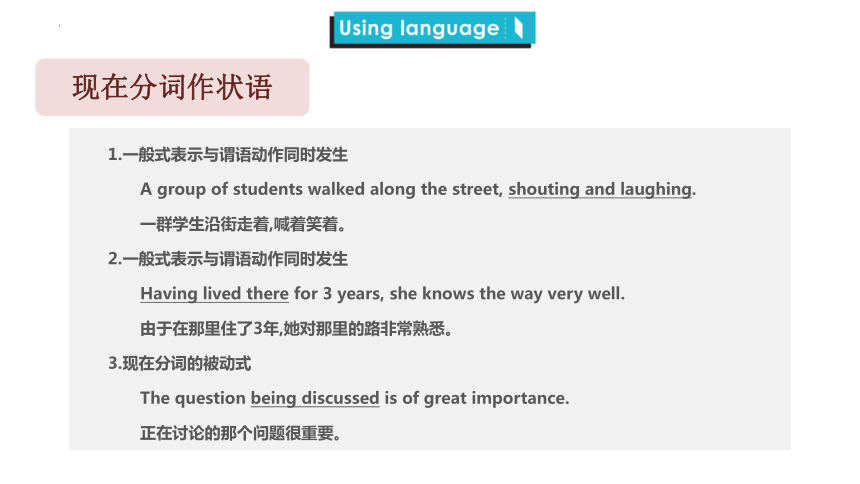

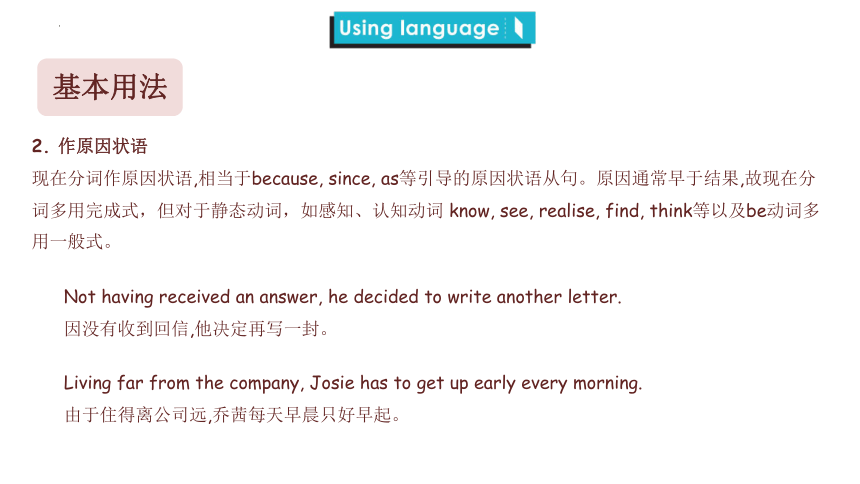

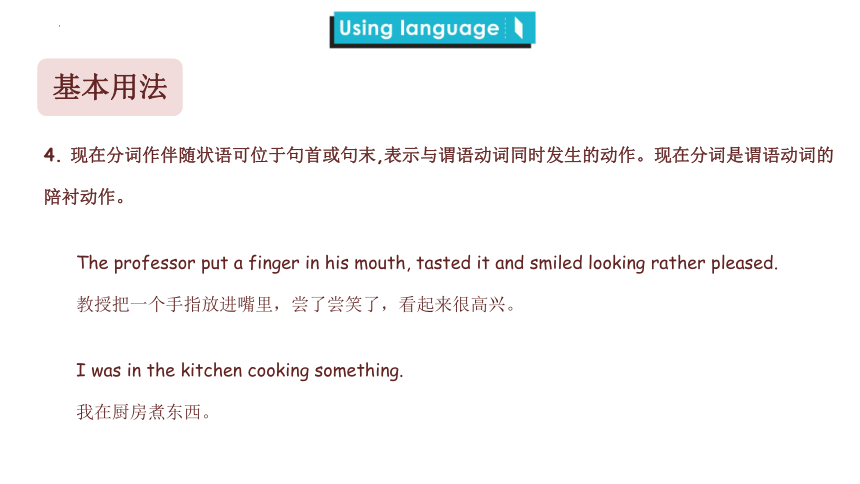
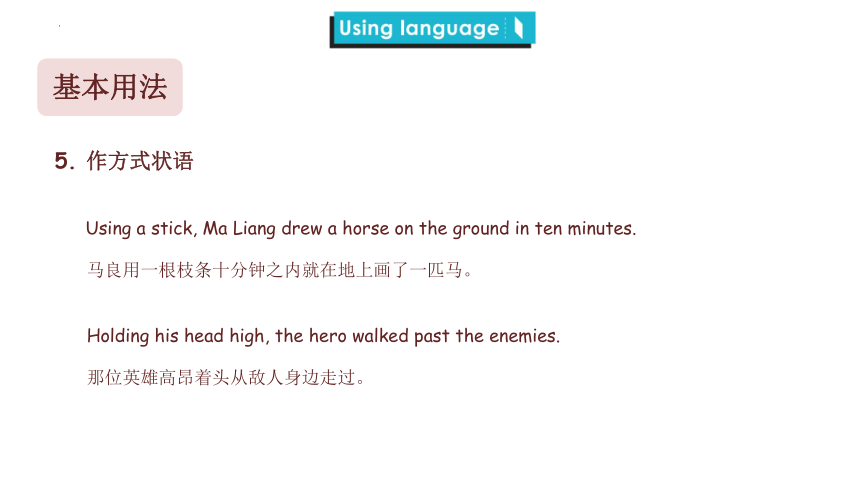
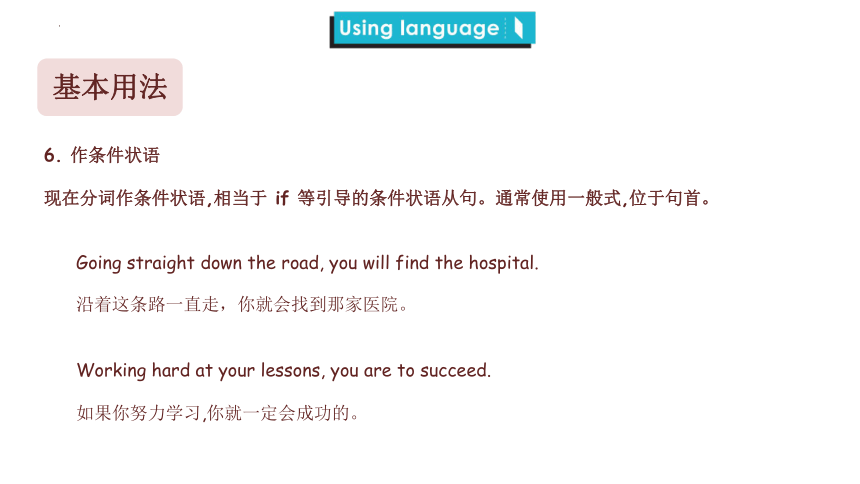
文档简介
(共42张PPT)
Unit 4
Stage and screen
Look at the sentences from the reading passage and answer the questions.
In sentence (a), who had seen quite a few productions of Hamlet and read the play many times In sentence (b), who saw the main characters come on stage
“I”
“I”
Is this structure used more often in spoken or written English
It’s used more often in written English.
Compare sentences a and b with sentences c and d and answer the questions.
What is the difference between the two groups of sentences
Why does the author choose to use sentences (a) and (b) in the reading passage
The first group uses present participles as adverbial while the second group uses adverbial clauses.
The sentences from the reading passage are more concise and formal.
-ing as adverbial——现在分词作状语
动词的现在分词在形式上现在分词跟动名词一样,也是由“动词 +-ing形式”构成。其语法作用,除了构成进行时态之外,在句中还可以作定语、表语、补足语和各种状语。
现在分词无人称和数的变化,不能单独作句子的谓语,但它具备了动词的基本特征,可以有自己的宾语和状语,有时态和语态的变化。
现在分词作状语
现在分词有一般式、完成式两种时态形式,以及主动被动两种语态形式。它的各种形式如下表所示(以动词do为例):
时态形式 主动式 被动式
一般式 doing being done
完成式 having done having been done
否定形式在doing之前加not
现在分词作状语
1.一般式表示与谓语动作同时发生
A group of students walked along the street, shouting and laughing.
一群学生沿街走着,喊着笑着。
2.一般式表示与谓语动作同时发生
Having lived there for 3 years, she knows the way very well.
由于在那里住了3年,她对那里的路非常熟悉。
3.现在分词的被动式
The question being discussed is of great importance.
正在讨论的那个问题很重要。
基本用法
在一个复合句中,当主句的主语跟从句的主语完全一致时,为了表达简练,可以把从句转换为分词短语形式,代替原来的从句。反过来,分词短语作状语,又可以转换成相应的状语从句或并列句。
1. 作时间状语
现在分词作时间状语,相当于when, while, after等引导的时间状语从句。一般式表示动作与谓语动词同时或相继发生。完成式表示动作先于谓语动词发生。
Having finished the housework, she got ready to go shopping
做完家务活之后,她准备去购物。
Having completed his homework, Tom went out to play for a while.
完成家庭作业之后,汤姆出去玩了一会儿。
基本用法
2. 作原因状语
现在分词作原因状语,相当于because, since, as等引导的原因状语从句。原因通常早于结果,故现在分词多用完成式,但对于静态动词,如感知、认知动词 know, see, realise, find, think等以及be动词多用一般式。
Not having received an answer, he decided to write another letter.
因没有收到回信,他决定再写一封。
Living far from the company, Josie has to get up early every morning.
由于住得离公司远,乔茜每天早晨只好早起。
基本用法
3. 作结果状语
现在分词作结果状语,一般位于旬末。前文表示原因现在分词表示造成的必然结果。
The fire lasted nearly two days, leaving nothing valuable.
大火持续了将近两天,没剩下有价值的东西。
It has rained for over ten days, causing the river to rise.
下了十多天雨,致使河水上涨。
基本用法
4. 现在分词作伴随状语可位于句首或句末,表示与谓语动词同时发生的动作。现在分词是谓语动词的陪衬动作。
The professor put a finger in his mouth, tasted it and smiled looking rather pleased.
教授把一个手指放进嘴里,尝了尝笑了,看起来很高兴。
I was in the kitchen cooking something.
我在厨房煮东西。
基本用法
5. 作方式状语
Using a stick, Ma Liang drew a horse on the ground in ten minutes.
马良用一根枝条十分钟之内就在地上画了一匹马。
Holding his head high, the hero walked past the enemies.
那位英雄高昂着头从敌人身边走过。
基本用法
6. 作条件状语
现在分词作条件状语,相当于 if 等引导的条件状语从句。通常使用一般式,位于句首。
Going straight down the road, you will find the hospital.
沿着这条路一直走,你就会找到那家医院。
Working hard at your lessons, you are to succeed.
如果你努力学习,你就一定会成功的。
基本用法
7. 作让步状语
现在分词作让步状语,相当于 though/although, even if/even though 等引导的让步状语从句,此用法相对少见。
Having failed many times, I still have faith in my future. = Though I have failed many times, I still have faith in my future.
尽管失败多次,我仍然对未来充满信心。
Admitting that he has made some progress, I still don't think he has tried his best.
我承认他取得了一些进步,但我仍然认为他没有尽最大努力
基本用法
8. 作程度状语
在一些习惯用法中,现在分词可以作程度状语,意为“很,非常,极度”,相当于程度副词 very, extremely 等。
I was boiling hot and sweaty. 我浑身滚烫,大汗淋漓。
It's freezing cold today for October. 相对于十月份来说,今天天气太冷了。
It was burning hot yesterday. 昨天非常炎热。
基本用法
9. 作评注性状语
有些惯用的分词短语在句中可以独立存在,它们往往作为句子的独立成分来修饰全句,表明说话者的态度、观点、评价等,我们称这种状语为评注性状语。
Generally speaking, girls are more interested in literature than boys.
一般说来,女孩比男孩更喜欢文学。
Judging by his actions, he is rather selfish.
从他的所作所为可以看出他比较自私。
Watch the video and answer the questions.
1 What theatres are mentioned in the video
2 What are the differences between them
In what ways are they similar
The Deheyuan Grand Theatre and the Globe Theatre.
2 What are the differences between them
In what ways are they similar
Differences: The Deheyuan Grand Theatre is a Chinese-style theatre built in the Qing Dynasty for the royal family, with Peking Opera as the main performance form. The theatre has three stages representing happiness, prosperity and longevity. Under the longevity stage, there is a well and five ponds. The Globe Theatre was built in London by a group of actors including William Shakespeare. It burnt down in 1613 and was rebuilt close to the site of the original building. The theatre has a round shape and the stage area has three main elements.
Similarities: Both of the theatres have a long history. They are both specially designed for better stage effects.
Complete the journal entry with the correct form of the verbs in brackets.
Seeing
felt
making
to practise/practising
Feeling
knowing
I went to watch the ballet The Peony Pavilion last night. Because I thought ballet was more or less the same everywhere, I was totally unprepared for its unique beauty. As soon as the curtain rose, I was absorbed. The performance borrowed a lot from Chinese dance and music, so the Eastern influence on the ballet was clear. The production was full of colours and romantic symbols, and challenged my senses in new ways. I enjoyed it so much that it's changed my opinion about ballet. I can't wait to go again!
Rewrite the paragraph using the -ing form.
Having thought
Borrowing
challenging
Enjoying
×
What type of TV programmes do you like
cartoon
news programme
talent show
comedy
nature documentary
talk show
a
b
c
d
e
f
1. What do you know about these types of TV programme
2. Can you think of some examples of each type
Read and match the descriptions to the types of TV programme in Activity 4. Underline the words and expressions describing them.
c
e
Read and match the descriptions to the types of TV programme in Activity 4. Underline the words and expressions describing them.
d
a
Read and match the descriptions to the types of TV programme in Activity 4. Underline the words and expressions describing them.
b
f
Work in pairs.
Talk about your favourite TV programme using the words and expressions you have learnt.
A:What’s your favourite TV programme
B:My favourite TV programme is... It’s a...
A:Why do you like it
...
Did You Know
Dating back to the 1970s, Glastonbury Festival is a music and arts festival that takes place on a large farm in Somerset in South-west England. Most of the organisers are volunteers and much of the money raised from ticket sales goes to charity. Many famous bands have performed at the festival
over the years, and the number of people attending has grown to about 200,000.
Listen to the conversation and choose the correct memo.
Listen again and complete the flyer.
Now talk about how Josh makes arrangements. Listen again if necessary.
24
28
London Paddington
£70. 40
London Victoria
£30
10:00 am
10:30 pm
Activity 9
Work in pairs.
Act out the conversation about making arrangements to go to a comedy show.
student A
You want to go to a comedy show this weekend. Tell Student B about the show and make arrangements to go and see it together.
student B
Student A wants to go to a comedy show this weekend. Listen for information about the show and make arrangements to go and see it together. You will need to ask for the following information:
time and place of the show
where and when to meet
how to get there
what to take with you
Activity 9
Vocabulary
1. grateful
gratitude n.感激之情,感谢
be grateful to sb. for sth. 因某事而感激某人
be grateful to do sth. 因做某事而感激
be grateful that... 感激……
I would be grateful if you could/would...=I would appreciate it if you could/would...
如果你能……我将不胜感激。(用于提出请求)
练习:She was extremely grateful _____ Tom _____ his support.
to
for
Vocabulary
2. extremely
extremely cold/dangerous 极其寒冷的危险的
extremely useful 非常有用;极有用的
extremely high 非常高的
extremely anxious 急不可待
extremely painful 极度疼痛/痛苦的
extremely difficult 极其困难的
练习:This cake is ___________ (extreme) delicious and you have to tell me all about it.
extremely
Vocabulary
3. give up
give up smoking 戒烟
give up one's job 放弃工作
give up easily 轻易放弃
give up doing sth. 放弃做某事
give oneself/sb. up to 自首;投案;投降
练习:I don't see any reason to give _____ work.
up
Vocabulary
4. overcome
overcome the fear 克服恐惧
overcome difficulties/bad habits 改掉困难/克服恶习
overcome disadvantages 克服不利条件
overcome obstacles 克服障碍
overcome the enemy 战胜敌军
be overcome with emotion/excitement/horror/grief
因情感/兴奋/恐怖/悲伤而不能自持
练习:She has the determination _____________ (overcome) all the difficulties.
to overcome
Vocabulary
5. absolutely
absolute adj.绝对的;完全的
absolutely impossible 绝对不可能
absolutely right 完全正确
absolutely necessary 绝对必要
have absolutely no experience 完全没有经验
Absolutely! (口)正是!当然!
Absolutely not! (口)绝对不行!当然不!
练习: Some marriages have ____________ for lack of money.
absolutely
Vocabulary
6. rude
rudely adv.无礼地,粗暴地
rudeness n.粗鲁;无礼
be rude to sb. 对某人粗鲁/无礼
be rude about sth. 对某事加以指责
It's rude to do sth. 做某事是无礼的
appear/sound rude 显得 /听起来粗鲁
be in a rude manner 举止粗鲁
练习:If someone sits right next to me in an empty movie theater, is it rude________ (move)
to move
Vocabulary
7. transport
transportation n.交通;运输
a means/form of transport 交通方式
have one’s own transport 有自己的交通工具
travel on/by public transport 乘坐公共交通工具出行
air/rail/road transport 空中/铁路/公路运输
the government's transport policy 政府的交通运输政策
transport... (from...) to... 把……(从……)运往……
练习:Fresh produce in this region __________________ (transport) to the supermarket.
is transported
Vocabulary
8. arrangement
arrange v.安排;排列;整理
arrangement for... 对……的安排
make/adjust/accept an arrangement 做/调整/接受安排
make arrangements/an arrangement for.. 为……做安排
练习:I am looking forward to being told about your _________________ (arrange) of vacation.
arrangements
1. She called at every door, __________ people the exciting news. (tell)
2. Jack was a lazy boy. I often caught him __________ in class. (sleep)
3. His words left me __________ what he was driving at. (wonder)
4. __________ to the left, you will see the post office. (turn)
5. __________ the key, the boy couldn't enter his house. (lose)
Exercise
telling
sleeping
wondering
Turning
Having lost
6. Generally __________, if __________ according to the directions, the drug has no side
effect. (speak, take)
7. When I was little, my mother used to sit by my bed, __________ me stories till I fell asleep.
(tell)
8. __________ the course very difficult, she decided to move to a lower level. (find)
9. ___________ to reach them on the phone, we sent an email instead. (fail)
10. The party will be held in the garden, weather __________. (permit)
Exercise
speaking
taken
telling
Finding
Having failed
permitting
Review the language points and complete the exercises.
Work in pairs. Make arrangements to attend
a concert in another city
Homework
See you next class!
Unit 4
Stage and screen
Look at the sentences from the reading passage and answer the questions.
In sentence (a), who had seen quite a few productions of Hamlet and read the play many times In sentence (b), who saw the main characters come on stage
“I”
“I”
Is this structure used more often in spoken or written English
It’s used more often in written English.
Compare sentences a and b with sentences c and d and answer the questions.
What is the difference between the two groups of sentences
Why does the author choose to use sentences (a) and (b) in the reading passage
The first group uses present participles as adverbial while the second group uses adverbial clauses.
The sentences from the reading passage are more concise and formal.
-ing as adverbial——现在分词作状语
动词的现在分词在形式上现在分词跟动名词一样,也是由“动词 +-ing形式”构成。其语法作用,除了构成进行时态之外,在句中还可以作定语、表语、补足语和各种状语。
现在分词无人称和数的变化,不能单独作句子的谓语,但它具备了动词的基本特征,可以有自己的宾语和状语,有时态和语态的变化。
现在分词作状语
现在分词有一般式、完成式两种时态形式,以及主动被动两种语态形式。它的各种形式如下表所示(以动词do为例):
时态形式 主动式 被动式
一般式 doing being done
完成式 having done having been done
否定形式在doing之前加not
现在分词作状语
1.一般式表示与谓语动作同时发生
A group of students walked along the street, shouting and laughing.
一群学生沿街走着,喊着笑着。
2.一般式表示与谓语动作同时发生
Having lived there for 3 years, she knows the way very well.
由于在那里住了3年,她对那里的路非常熟悉。
3.现在分词的被动式
The question being discussed is of great importance.
正在讨论的那个问题很重要。
基本用法
在一个复合句中,当主句的主语跟从句的主语完全一致时,为了表达简练,可以把从句转换为分词短语形式,代替原来的从句。反过来,分词短语作状语,又可以转换成相应的状语从句或并列句。
1. 作时间状语
现在分词作时间状语,相当于when, while, after等引导的时间状语从句。一般式表示动作与谓语动词同时或相继发生。完成式表示动作先于谓语动词发生。
Having finished the housework, she got ready to go shopping
做完家务活之后,她准备去购物。
Having completed his homework, Tom went out to play for a while.
完成家庭作业之后,汤姆出去玩了一会儿。
基本用法
2. 作原因状语
现在分词作原因状语,相当于because, since, as等引导的原因状语从句。原因通常早于结果,故现在分词多用完成式,但对于静态动词,如感知、认知动词 know, see, realise, find, think等以及be动词多用一般式。
Not having received an answer, he decided to write another letter.
因没有收到回信,他决定再写一封。
Living far from the company, Josie has to get up early every morning.
由于住得离公司远,乔茜每天早晨只好早起。
基本用法
3. 作结果状语
现在分词作结果状语,一般位于旬末。前文表示原因现在分词表示造成的必然结果。
The fire lasted nearly two days, leaving nothing valuable.
大火持续了将近两天,没剩下有价值的东西。
It has rained for over ten days, causing the river to rise.
下了十多天雨,致使河水上涨。
基本用法
4. 现在分词作伴随状语可位于句首或句末,表示与谓语动词同时发生的动作。现在分词是谓语动词的陪衬动作。
The professor put a finger in his mouth, tasted it and smiled looking rather pleased.
教授把一个手指放进嘴里,尝了尝笑了,看起来很高兴。
I was in the kitchen cooking something.
我在厨房煮东西。
基本用法
5. 作方式状语
Using a stick, Ma Liang drew a horse on the ground in ten minutes.
马良用一根枝条十分钟之内就在地上画了一匹马。
Holding his head high, the hero walked past the enemies.
那位英雄高昂着头从敌人身边走过。
基本用法
6. 作条件状语
现在分词作条件状语,相当于 if 等引导的条件状语从句。通常使用一般式,位于句首。
Going straight down the road, you will find the hospital.
沿着这条路一直走,你就会找到那家医院。
Working hard at your lessons, you are to succeed.
如果你努力学习,你就一定会成功的。
基本用法
7. 作让步状语
现在分词作让步状语,相当于 though/although, even if/even though 等引导的让步状语从句,此用法相对少见。
Having failed many times, I still have faith in my future. = Though I have failed many times, I still have faith in my future.
尽管失败多次,我仍然对未来充满信心。
Admitting that he has made some progress, I still don't think he has tried his best.
我承认他取得了一些进步,但我仍然认为他没有尽最大努力
基本用法
8. 作程度状语
在一些习惯用法中,现在分词可以作程度状语,意为“很,非常,极度”,相当于程度副词 very, extremely 等。
I was boiling hot and sweaty. 我浑身滚烫,大汗淋漓。
It's freezing cold today for October. 相对于十月份来说,今天天气太冷了。
It was burning hot yesterday. 昨天非常炎热。
基本用法
9. 作评注性状语
有些惯用的分词短语在句中可以独立存在,它们往往作为句子的独立成分来修饰全句,表明说话者的态度、观点、评价等,我们称这种状语为评注性状语。
Generally speaking, girls are more interested in literature than boys.
一般说来,女孩比男孩更喜欢文学。
Judging by his actions, he is rather selfish.
从他的所作所为可以看出他比较自私。
Watch the video and answer the questions.
1 What theatres are mentioned in the video
2 What are the differences between them
In what ways are they similar
The Deheyuan Grand Theatre and the Globe Theatre.
2 What are the differences between them
In what ways are they similar
Differences: The Deheyuan Grand Theatre is a Chinese-style theatre built in the Qing Dynasty for the royal family, with Peking Opera as the main performance form. The theatre has three stages representing happiness, prosperity and longevity. Under the longevity stage, there is a well and five ponds. The Globe Theatre was built in London by a group of actors including William Shakespeare. It burnt down in 1613 and was rebuilt close to the site of the original building. The theatre has a round shape and the stage area has three main elements.
Similarities: Both of the theatres have a long history. They are both specially designed for better stage effects.
Complete the journal entry with the correct form of the verbs in brackets.
Seeing
felt
making
to practise/practising
Feeling
knowing
I went to watch the ballet The Peony Pavilion last night. Because I thought ballet was more or less the same everywhere, I was totally unprepared for its unique beauty. As soon as the curtain rose, I was absorbed. The performance borrowed a lot from Chinese dance and music, so the Eastern influence on the ballet was clear. The production was full of colours and romantic symbols, and challenged my senses in new ways. I enjoyed it so much that it's changed my opinion about ballet. I can't wait to go again!
Rewrite the paragraph using the -ing form.
Having thought
Borrowing
challenging
Enjoying
×
What type of TV programmes do you like
cartoon
news programme
talent show
comedy
nature documentary
talk show
a
b
c
d
e
f
1. What do you know about these types of TV programme
2. Can you think of some examples of each type
Read and match the descriptions to the types of TV programme in Activity 4. Underline the words and expressions describing them.
c
e
Read and match the descriptions to the types of TV programme in Activity 4. Underline the words and expressions describing them.
d
a
Read and match the descriptions to the types of TV programme in Activity 4. Underline the words and expressions describing them.
b
f
Work in pairs.
Talk about your favourite TV programme using the words and expressions you have learnt.
A:What’s your favourite TV programme
B:My favourite TV programme is... It’s a...
A:Why do you like it
...
Did You Know
Dating back to the 1970s, Glastonbury Festival is a music and arts festival that takes place on a large farm in Somerset in South-west England. Most of the organisers are volunteers and much of the money raised from ticket sales goes to charity. Many famous bands have performed at the festival
over the years, and the number of people attending has grown to about 200,000.
Listen to the conversation and choose the correct memo.
Listen again and complete the flyer.
Now talk about how Josh makes arrangements. Listen again if necessary.
24
28
London Paddington
£70. 40
London Victoria
£30
10:00 am
10:30 pm
Activity 9
Work in pairs.
Act out the conversation about making arrangements to go to a comedy show.
student A
You want to go to a comedy show this weekend. Tell Student B about the show and make arrangements to go and see it together.
student B
Student A wants to go to a comedy show this weekend. Listen for information about the show and make arrangements to go and see it together. You will need to ask for the following information:
time and place of the show
where and when to meet
how to get there
what to take with you
Activity 9
Vocabulary
1. grateful
gratitude n.感激之情,感谢
be grateful to sb. for sth. 因某事而感激某人
be grateful to do sth. 因做某事而感激
be grateful that... 感激……
I would be grateful if you could/would...=I would appreciate it if you could/would...
如果你能……我将不胜感激。(用于提出请求)
练习:She was extremely grateful _____ Tom _____ his support.
to
for
Vocabulary
2. extremely
extremely cold/dangerous 极其寒冷的危险的
extremely useful 非常有用;极有用的
extremely high 非常高的
extremely anxious 急不可待
extremely painful 极度疼痛/痛苦的
extremely difficult 极其困难的
练习:This cake is ___________ (extreme) delicious and you have to tell me all about it.
extremely
Vocabulary
3. give up
give up smoking 戒烟
give up one's job 放弃工作
give up easily 轻易放弃
give up doing sth. 放弃做某事
give oneself/sb. up to 自首;投案;投降
练习:I don't see any reason to give _____ work.
up
Vocabulary
4. overcome
overcome the fear 克服恐惧
overcome difficulties/bad habits 改掉困难/克服恶习
overcome disadvantages 克服不利条件
overcome obstacles 克服障碍
overcome the enemy 战胜敌军
be overcome with emotion/excitement/horror/grief
因情感/兴奋/恐怖/悲伤而不能自持
练习:She has the determination _____________ (overcome) all the difficulties.
to overcome
Vocabulary
5. absolutely
absolute adj.绝对的;完全的
absolutely impossible 绝对不可能
absolutely right 完全正确
absolutely necessary 绝对必要
have absolutely no experience 完全没有经验
Absolutely! (口)正是!当然!
Absolutely not! (口)绝对不行!当然不!
练习: Some marriages have ____________ for lack of money.
absolutely
Vocabulary
6. rude
rudely adv.无礼地,粗暴地
rudeness n.粗鲁;无礼
be rude to sb. 对某人粗鲁/无礼
be rude about sth. 对某事加以指责
It's rude to do sth. 做某事是无礼的
appear/sound rude 显得 /听起来粗鲁
be in a rude manner 举止粗鲁
练习:If someone sits right next to me in an empty movie theater, is it rude________ (move)
to move
Vocabulary
7. transport
transportation n.交通;运输
a means/form of transport 交通方式
have one’s own transport 有自己的交通工具
travel on/by public transport 乘坐公共交通工具出行
air/rail/road transport 空中/铁路/公路运输
the government's transport policy 政府的交通运输政策
transport... (from...) to... 把……(从……)运往……
练习:Fresh produce in this region __________________ (transport) to the supermarket.
is transported
Vocabulary
8. arrangement
arrange v.安排;排列;整理
arrangement for... 对……的安排
make/adjust/accept an arrangement 做/调整/接受安排
make arrangements/an arrangement for.. 为……做安排
练习:I am looking forward to being told about your _________________ (arrange) of vacation.
arrangements
1. She called at every door, __________ people the exciting news. (tell)
2. Jack was a lazy boy. I often caught him __________ in class. (sleep)
3. His words left me __________ what he was driving at. (wonder)
4. __________ to the left, you will see the post office. (turn)
5. __________ the key, the boy couldn't enter his house. (lose)
Exercise
telling
sleeping
wondering
Turning
Having lost
6. Generally __________, if __________ according to the directions, the drug has no side
effect. (speak, take)
7. When I was little, my mother used to sit by my bed, __________ me stories till I fell asleep.
(tell)
8. __________ the course very difficult, she decided to move to a lower level. (find)
9. ___________ to reach them on the phone, we sent an email instead. (fail)
10. The party will be held in the garden, weather __________. (permit)
Exercise
speaking
taken
telling
Finding
Having failed
permitting
Review the language points and complete the exercises.
Work in pairs. Make arrangements to attend
a concert in another city
Homework
See you next class!
